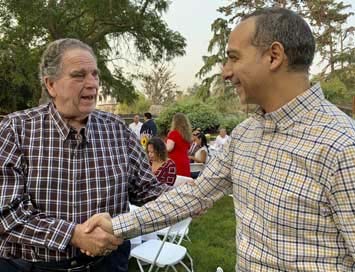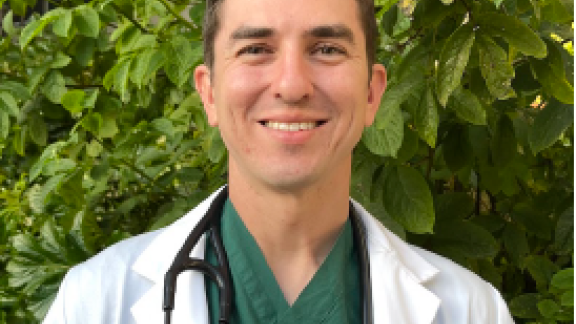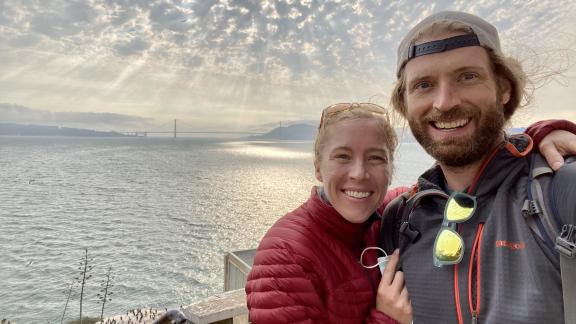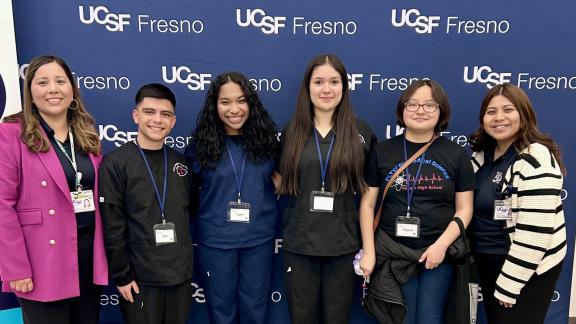UCSF Fresno pulmonary and critical care specialists have been on the frontlines of the COVID-19 pandemic since it started, providing the latest and best therapies available for thousands of critically ill patients in the San Joaquin Valley.
“We’re talking about a really, really huge number of patients,” said Mohamed Fayed, MD, a UCSF Fresno pulmonologist and critical care physician who estimates he has taken care of between 5,000 and 7,000 patients infected with COVID-19.
COVID-19 can damage lungs, causing mild to severe breathing problems and pneumonia and requiring the skills of lung specialists for treatment and care. Patients often require oxygen, either through a nasal cannula (low flow oxygen) or in severe cases patients can require high flow oxygen or pressurized air with a mask (non-invasive mechanical ventilation). The most seriously ill can develop worsening acute respiratory distress syndrome (ARDS) requiring invasive mechanical ventilation, where the lungs are seriously damaged.
In the most severe cases when mechanical ventilation is not enough, some patients are given ExtraCorporeal Membrane Oxygenation (ECMO) to support the lungs and allow time for lungs to heal. UCSF Fresno pulmonary and critical care physicians at Community Regional Medical Center (CRMC) are the only dedicated ECMO team in the San Joaquin Valley for adult patients. Over the past two years, the team has placed 55 patients with COVID-19 on ECMO. “It’s all about how much support the patient needs,” Dr. Fayed said. “It really makes us happy to be able to help people to that degree.”
UCSF Fresno pulmonologists have treated COVID-19 patients as young as 18 to as old as 99 years of age – pregnant women, breastfeeding moms. “We’ve seen everything,” Dr. Fayed said. Patients receive care specific to the severity of the illness. Dr. Fayed may see a patient who is stable once a day, but a sicker patient may have four visits and he can see a patient on ECMO as many as eight times in a day. Typically, patients who have underlying health conditions, such as diabetes, heart disease, liver disease and people over age 65 are more vulnerable to serious illness with COVID-19 and require more care.
Nat DiBuduo, 71, of Fresno knew he would be at risk for lung complications from COVID-19, and he thought, “if I was to get COVID, I wouldn’t have good results.” But he had a good outcome in December 2020, and he credits Dr. Fayed. “As far as I am concerned, he saved my life.”

DiBuduo had moderately severe COVID-19, needing oxygen and medication therapy. He was given dexamethasone, a corticosteroid, to help reduce inflammation in his lungs; and his therapy included remdesivir, an anti-viral medication, Dr. Fayed said. Remdesivir is widely used as a COVID-19 therapy now, and this is largely due to research early in the pandemic led by Eyad Almasri, MD, UCSF Fresno assistant dean of research and pulmonary and critical care specialist. UCSF Fresno investigators have been involved in dozens of COVID-19 clinical trials over the past two years and an arsenal of new drug therapies is now available to fight COVID-19
infections, including options of oral medications for outpatients. UCSF Fresno currently has five COVID-19 clinical trials for patients in the hospital and has one trial for outpatients, Dr. Fayed said.
“All of the tools we have now have definitely improved the outcomes for patients,” Dr. Fayed said. “Without these medications, we would have had more harm and more deaths in patients.”
Some COVID-19 patients have been caught off-guard by how quickly COVID-19 can affect oxygen levels in the blood and wait longer than they should to seek care, Dr. Fayed said. “By the time the patients come to us, the disease is advanced in their lungs,” he said.
DiBuduo thankfully sought care early. He and his wife got COVID-19 after returning home from a weeklong vacation at Newport Beach, Calif, in December 2020. (Vaccines for COVID-19 were not yet available.) The DiBuduos now are fully vaccinated and received booster shots from the UCSF Fresno Mobile HeaL COVID-19 Equity Project (CEP).
The couple were careful on vacation, wearing N95 masks and eating out only a couple of times at outdoor restaurant settings, but within days of being home, they had symptoms of COVID-19. “I was coughing and had respiratory difficulty breathing,” he said. “My wife’s symptoms were total fatigue, muscle pain, joint pain, headaches, sensitivity to light.” She did not need hospital care, but DiBuduo’s difficulty breathing worsened. He used a home pulse oximeter to monitor his blood oxygen levels. When the levels consistently dropped into the 80s (95% to 100% is considered normal), he went to the emergency department at CRMC.
His decision to go to the hospital likely spared DiBuduo from having to be on a high-pressure oxygen mask or on a ventilator – and averted a lengthy hospital stay. “He presented with low oxygen, but the degree of severity wasn’t too bad,” Dr. Fayed said. “He needed nasal oxygen only.”
DiBuduo, a Valley native with long-time ties to farming and winemaking, had family and friends praying for his recovery – and for Dr. Fayed, too. DiBuduo went home after a week in the hospital. “I asked (Dr. Fayed) to get me home for Christmas and he got me out of there on December 23. So, he held up his part of the promise,” DiBuduo said. “He’s a very busy doctor but he’s given us the personal attention we very much appreciate.”
Helping COVID-19 patients have successful recoveries is gratifying for Dr. Fayed. Providing the latest and best therapy for each patient is what he and colleagues at UCSF Fresno strive to do every day, he said. “We want to make sure that everyone has access to the best care.”





